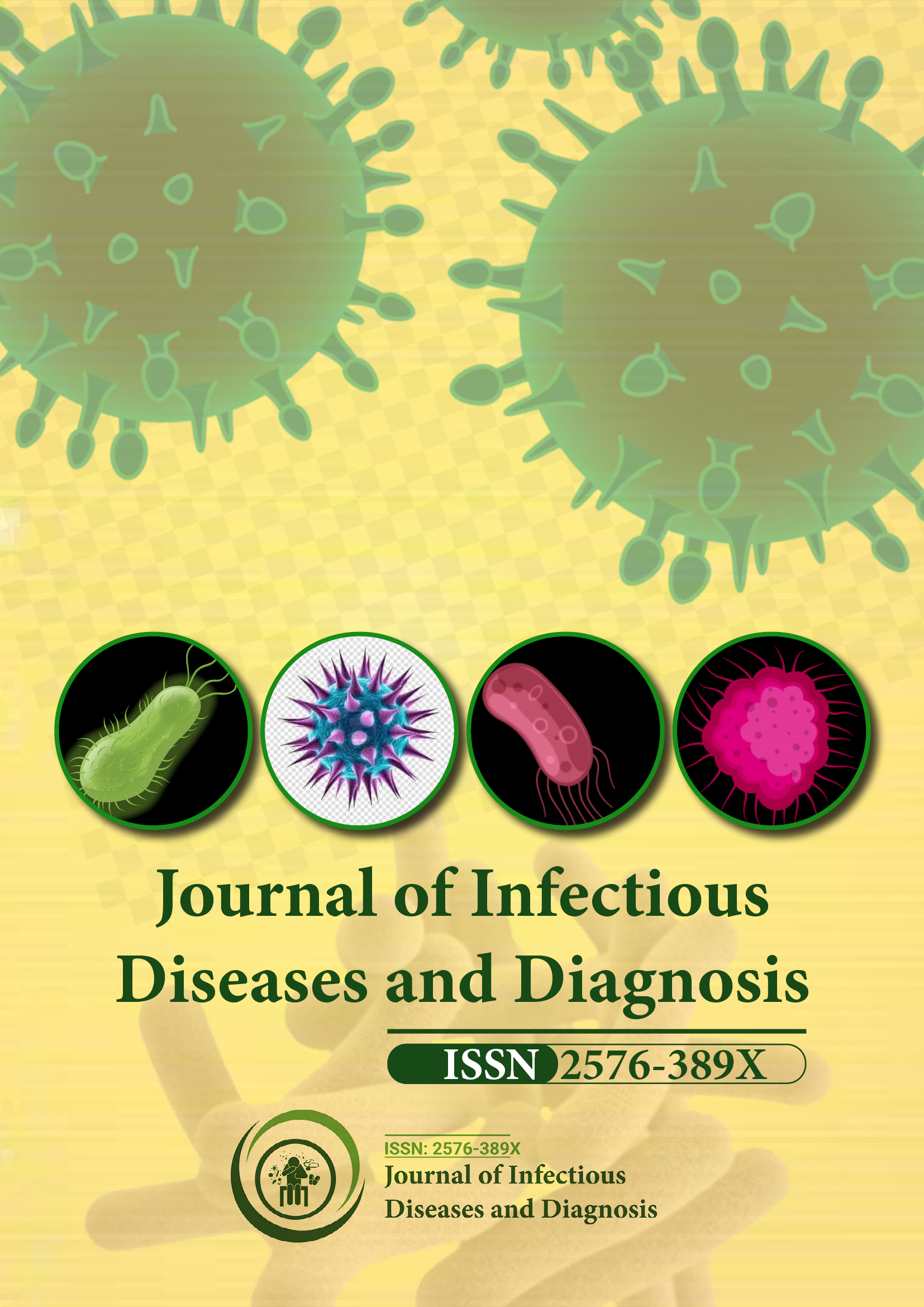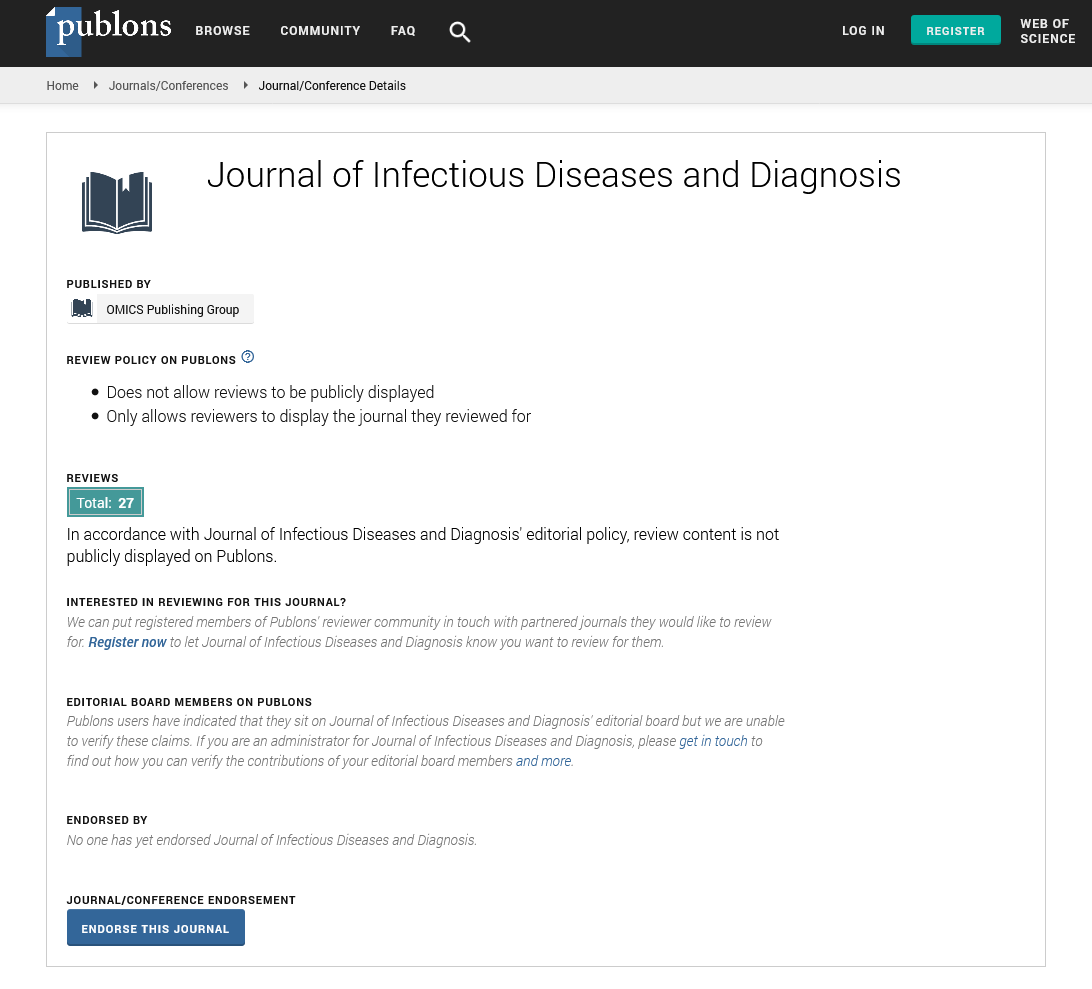Indexed In
- RefSeek
- Hamdard University
- EBSCO A-Z
- Publons
- Euro Pub
- Google Scholar
Useful Links
Share This Page
Journal Flyer

Open Access Journals
- Agri and Aquaculture
- Biochemistry
- Bioinformatics & Systems Biology
- Business & Management
- Chemistry
- Clinical Sciences
- Engineering
- Food & Nutrition
- General Science
- Genetics & Molecular Biology
- Immunology & Microbiology
- Medical Sciences
- Neuroscience & Psychology
- Nursing & Health Care
- Pharmaceutical Sciences
Perspective - (2023) Volume 8, Issue 6
Mitigating the Impact of the Delta Variant on Maternal Health and Pregnancy Outcomes
Danielle Rokas*Received: 16-Oct-2023, Manuscript No. JIDD-23-23544; Editor assigned: 18-Oct-2023, Pre QC No. JIDD-23-23544 (PQ); Reviewed: 01-Nov-2023, QC No. JIDD-23-23544; Revised: 08-Nov-2023, Manuscript No. JIDD-23-23544 (R); Published: 16-Nov-2023, DOI: 10.35248/2576-389X.23.08.241
About the Study
The ongoing COVID-19 pandemic, caused by the Severe Acute Respiratory Syndrome Coronavirus 2 (SARS-Cov-2), has presented numerous challenges to public health worldwide. As the virus continues to evolve, several variants with distinct characteristics have emerged. Among these, the Delta variant (B. 1.617.2) has gained significant attention due to its increased transmissibility and potential impact on disease severity. While extensive research has focused on the general characteristics of Delta, its effects on vulnerable populations, such as pregnant individuals, are of particular concern.
The Delta variant of SARS-CoV-2, first identified in India, has been characterized by several mutations in the spike protein of the virus. These mutations are thought to enhance the virus's infectivity and transmissibility, potentially making it more contagious than earlier strains. As a result, the Delta variant has rapidly become a dominant strain in various parts of the world.
Pregnant individuals have been a subject of concern throughout the pandemic. With changes in their immune system, respiratory physiology, and increased risk of severe outcomes from respiratory infections, pregnant women are considered a vulnerable population. Understanding how the Delta variant affects maternal infection and pregnancy is essential.
One key feature of the Delta variant is its heightened transmissibility. It has been suggested that the Delta variant is approximately 50% more transmissible than the Alpha variant (B.1.1.7), which was itself more transmissible than the original strain. The increased transmissibility of Delta has implications for pregnant individuals, who may face a higher risk of exposure to the virus if they are in areas with widespread transmission.
Vaccine efficacy
Vaccination has been a crucial tool in the fight against COVID-19. However, the Delta variant has raised questions about vaccine efficacy. Some studies have suggested that the Delta variant may partially evade the immune protection provided by certain vaccines, leading to concerns about the risk of breakthrough infections.
The implications of this for pregnant individuals are twofold. First, if vaccines are less effective against the Delta variant, pregnant individuals may have reduced protection if they are fully vaccinated. Second, the potential for an outbreak infections means that pregnant individuals may be at increased risk of exposure to the virus, further highlighting the importance of vaccine coverage in this population.
Maternal health and pregnancy outcomes
While the Delta variant's impact on pregnancy has not been comprehensively studied, research into the general effects of SARS-CoV-2 on maternal health and pregnancy outcomes provides some insights. Pregnant individuals infected with SARS- CoV-2 are at a higher risk of severe outcomes, including preterm birth, stillbirth, and admission to the Intensive Care Unit (ICU).
The increased transmissibility of the Delta variant may lead to a higher likelihood of pregnant individuals coming into contact with the virus, potentially increasing the number of cases and associated adverse outcomes. This underscores the importance of implementing measures to reduce transmission and protect pregnant individuals, such as vaccination, mask-wearing, and social distancing.
Vertical transmission
Another critical concern in the context of maternal infection is the possibility of vertical transmission, where the virus is transmitted from the pregnant individual to the fetus during pregnancy or childbirth. To date, evidence of vertical transmission of SARS-CoV-2 has been limited. However, the Delta variant's unique characteristics may warrant further investigation into this aspect.
While vertical transmission remains relatively rare, the potential for more cases due to the increased prevalence of the Delta variant highlights the importance of prenatal monitoring and surveillance.
Challenges and recommendations
As the COVID-19 pandemic continues to evolve with the emergence of new variants, it is crucial to adapt public health strategies to protect pregnant individuals and their unborn children.
Vaccination: Encouraging pregnant individuals to receive COVID-19 vaccines, while also ensuring access to accurate information about vaccine safety during pregnancy, is essential. It is crucial to consider booster doses for this population, especially if evidence suggests that the Delta variant reduces vaccine efficacy.
Surveillance and monitoring: Rigorous surveillance of COVID-19 cases among pregnant individuals is necessary to track trends and outcomes. Collecting data on pregnancy outcomes, including preterm birth and stillbirth, will provide valuable insights.
Antenatal care: Pregnant individuals should receive consistent antenatal care, which includes monitoring for COVID-19 symptoms, routine testing when indicated, and close monitoring of high-risk pregnancies.
Protection measures: Pregnant individuals should be advised to continue adhering to protective measures, such as mask-wearing and physical distancing, especially in areas with high transmission rates.
Education and support: Providing pregnant individuals with up- to-date information about the risks of COVID-19 during pregnancy, as well as guidance on preventive measures can empower them to make informed decisions.
Conclusion
The Delta variant of SARS-CoV-2 has introduced new challenges to the ongoing battle against COVID-19. For pregnant individuals, these challenges include increased transmissibility, potential changes in vaccine efficacy, and a higher risk of severe outcomes associated with maternal infection.
The evolving nature of the pandemic emphasizes the importance of adapting and intensifying efforts to protect this vulnerable population. Ensuring access to vaccination, continued monitoring, and adherence to protective measures are critical steps to mitigate the impact of the Delta variant on maternal infection and pregnancy outcomes.
As research into the Delta variant and its effects on pregnancy continues, the healthcare community and policymakers must remain vigilant and responsive to protect the health and well- being of pregnant individuals and their unborn children in the face of this evolving threat.
Citation: Rokas D (2023) Mitigating the Impact of the Delta Variant on Maternal Health and Pregnancy Outcomes. J Infect Dis Diagn. 8:241.
Copyright: © 2023 Rokas D. This is an open-access article distributed under the terms of the Creative Commons Attribution License, which permits unrestricted use, distribution, and reproduction in any medium, provided the original author and source are credited.

